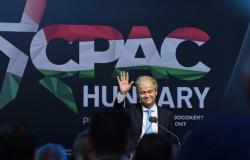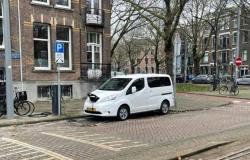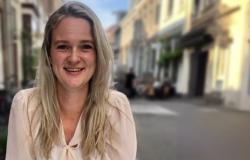
Of the nine students who have been blocking the bridge that gives access to the Amsterdam University College (AUC) at Science Park with Palestinian flags since half past seven in the morning on Thursday, two hours later – after two warnings by the police – three remained.
The other six joined twenty bystanders. They all chant slogans at two police officers: ‘AUC, you can’t hide, stop supporting genocide‘ and ‘no justice, no peace, stop the racist police‘. The three who remained on the bridge were arrested a little later.
The police are there every day this week, always earlier: Monday at two in the afternoon, Thursday at half past nine in the morning. A total of seventeen arrests were made.
Far-reaching consequences
Students and some teachers are shocked that last Monday the police pushed people to the ground to arrest them and used batons to keep others at a distance. Since then, the tension has increased at the demonstrations, which have been held daily since this week.
The blockade has far-reaching consequences. Many classes and tests have been canceled or moved. At least 24 teachers signed an open letter to the dean, criticizing his decision to involve the police.
A conversation that the dean was supposed to have with students on Wednesday afternoon about the unrest was stopped prematurely due to an ‘unsafe situation’. According to Dean Martin van Hees, people tried to enter the building wearing face coverings, ‘in a way that was not in accordance with safety standards’. The building was then sealed off.
Is a university neutral?
On AUC, the liberal arts and sciencescourse from the University of Amsterdam and Vrije Universiteit, there are approximately 900 students, who also live on campus together.
The protests for Palestine did not happen yesterday: as early as October there were sit-ins in the AUC building, organized by the action group AUFP. The university has given ample scope for this. The demonstrators want the university to speak out about the ‘genocide in Gaza’ and to break ties with Israeli universities and institutions. This week it was decided to implement a daily blockade because those demands have not been met.
A common complaint is that the university immediately spoke out against Russia after the invasion of Ukraine, with flags and flyers. “Now they say they are apolitical,” says Kristina Horinkova (22). “Is a university neutral? We don’t think so, and we ask for self-criticism and self-reflection.” Rector Peter-Paul Verbeek (UvA) previously said yes Het Parool not wanting to speak out (see box).
Walking on eggshells
The fact that students also live together at the Science Park is pleasant in good times and promotes academic performance. But now both students and some teachers describe the atmosphere as tense and polarized.
Students also do not want to be named because they fear disciplinary measures from AUC. Three students have already received this due to previous protests. As a result, for example, they are not allowed to go on exchange abroad.
A 20-year-old Jewish student says she feels physically safe at university, but is afraid to give her opinion. “I know my fellow students and know that they are not violent. But insecurity has many definitions.”
She has the feeling of having to ‘walk on eggshells’ and not being able to fully speak out, especially because according to her some slogans are about the destruction of Israel. “No one has asked me: what do you actually think about that? That feels trivializing, as if my feelings don’t count.”
She does not experience anti-Semitism on campus, but she does experience it online. “And I fear that protests like this open the door to anti-Semitism.”
‘Huge dilemma’
She finds it ‘shocking’ that the police were called. “Management has no idea how emotional people are.” That feeling also exists among teachers, such as earth sciences teacher Misha Velthuis. “At university we practice every day to find each other with words. It is deeply sad that the university is calling on the police.”
Yes, he agrees, the university’s management faces an ‘enormous dilemma’. “I wouldn’t want to be in their shoes. But I am convinced that there are other ways than calling the police.”
A police spokesperson confirmed the seventeen arrests. “We asked students to leave the bridge three times in English and Dutch and designated another place where they could demonstrate. Because they did not want to leave, the police lifted them up, but there was absolutely no violence involved.
Velthuis signed the aforementioned petition ‘out of concern for the safety of students, to whom we have a duty of care’. They call the fact that it is unknown on what grounds the three students were punished in March ‘controversial’ and ‘disturbing’. “The atmosphere is grim and there is no confidence in the management,” says teacher Mona Hegazy. “The fact that we do not know who passed on the names of the students to the dean creates tension.”
Intervene faster
What does the educational management think of the situation? Dean Martin van Hees is upset: “Terrible. What is happening now is unprecedented and deeply affects us all.”
Although AUC attaches great importance to social debate, according to Van Hees, education must always be able to continue. The difference with previous protests is that this was not possible last week due to the complete blockade of the building: that is why the police were called.
“Disturbing education and blocking the building is a clear boundary. I understand that there are concerns, unrest and dissatisfaction among some teachers and students about police action. Some teachers have allowed lessons to continue in Café Polder, around the corner.”
Van Hees explains: if a blockade continues, AUC will inform the UvA and VU. They call the police, and then the police in the triangle (with the mayor and the Public Prosecution Service) determine their course of action. On Wednesday there was an ‘acceleration’ in the decision-making process, allowing the police to intervene earlier.
Van Hees is brief about the safety of Israeli and Jewish students and teachers. “It is clear that the situation is very intense for them.”
Rector UvA: ‘Precisely because universities are the place where you can express criticism, we do not want to speak out’
Rector Peter-Paul Verbeek of the University of Amsterdam previously said against Het Parool not in favor of a statement about Israel/Gaza. He drew inspiration from an article The Green Amsterdammer in which the conclusion of the 1967 Kalven Committee report was quoted. He conducted research into how the University of Chicago should respond to the Vietnam War.
“Precisely because universities are the place where you can express criticism, where you can find new and disruptive ideas, the university itself cannot take a stand. Because then you set one standard. And anyone who does not meet that standard does not feel at home. For that reason we do not want to speak out.”
read more
About the authors: Tahrim Ramdjan has been writing for Het Parool since 2019, including about everyday news, law, young people, discrimination and the South East district. Madelief van Dongen is a news reporter for Het Parool. She writes about all kinds of Amsterdam topics, from tourist policy to squatted buildings, and reports live on events in the city. Tips are welcome at [email protected] and [email protected].
Tags: Seventeen arrests days proPalestine demonstration Amsterdam University College Terrible happening unprecedented
-




